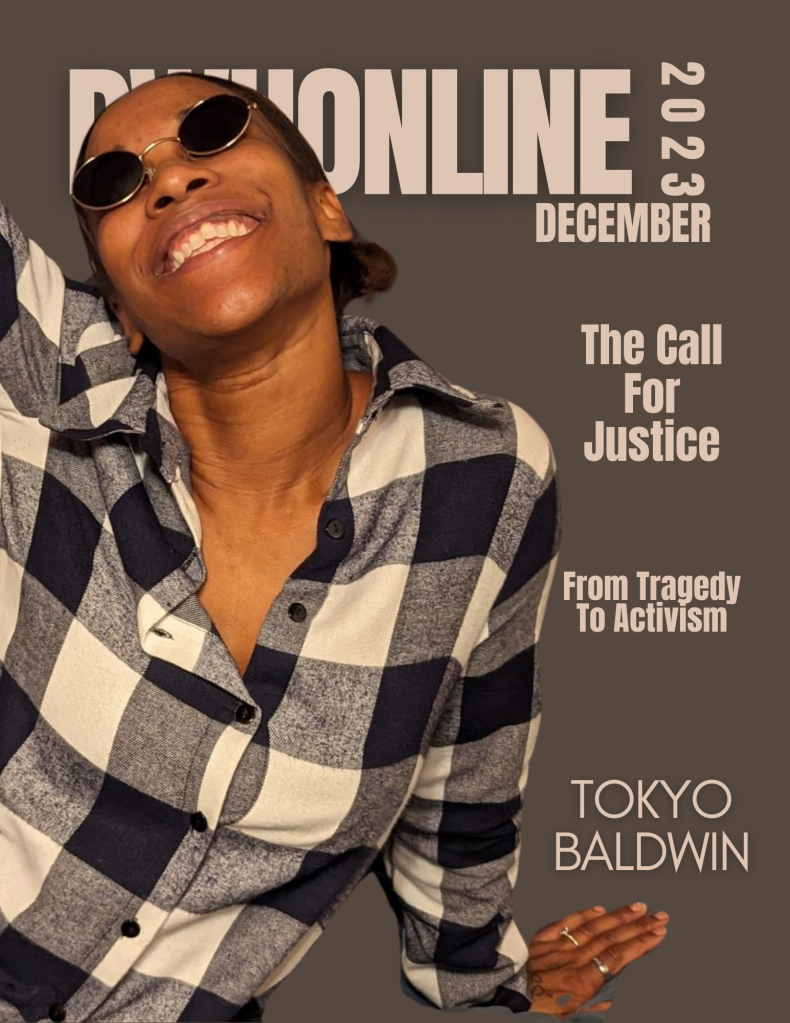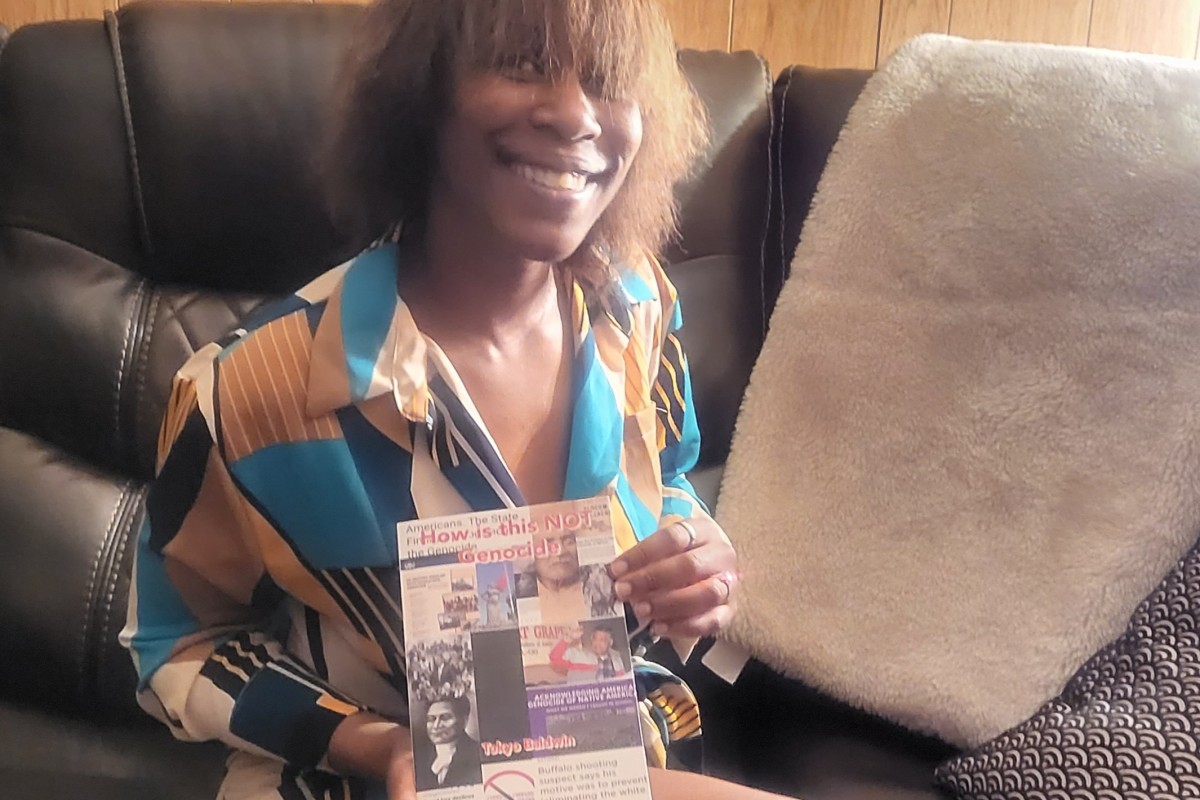
Tokyo Baldwin started her journey towards activism, abolitionism, and social justice/racial justice by founding End the Genocide of BIPOC LLC. An LLC that prioritizes the BIPOC community in the attainment of Equity and Sustainability. While researching the history of Genocide in the US she learned of a Document entitled, “We Charge Genocide”. This petition was presented to the UN in 1951 by Paul Robeson and William Patterson. It charges the US Government with the Genocide of Black identifying humans. Inspired by the previous petition, she created a new petition called, “End the Genocide of BIPOC”, which includes all BIPOC identifying humans in charging the US with the Genocide of its BIPOC people/ communities. She has also just published her new book entitled, How is this NOT Genocide. The book is now available on Amazon, Kindle, and Ingram online platforms. Tokyo is currently employed with the Wildflower Alliance as their Career Initiative Coordinator. She is also a member of their training team and a peer support advocate.
As a CEO, mother, and wife, her desire to create a better quality of life for her family is the driving force of her ambition. She is deeply spiritual and supports her community by working at The Afiya House; New England’s 1st Peer run respite. Through the Wildflower Alliance, Tokyo is in line to become the Director of one of the 1st BIPOC peer-run respites to be established in MA as an affinity space for the aforementioned communities. She attends hearings and provides testimony to promote bills to establish peer-run respites all across the commonwealth of MA and hopefully, one day, the whole world. It is Tokyo’s firm belief that all humans are connected to one another. She hopes to be able to witness a day in which the world promotes love!
We had the pleasure of sitting down with Tokyo to discuss the inspiration and passion behind her brand and community work:
Tell us about your journey into activism and social justice, when did you realize you had a passion for justice?
I have always had an interest in Criminal Justice as well as Social Justice and Human Rights. The textbooks provided in Criminal Justice courses state plainly that there are biases in law enforcement’s response to Black and Indigenous People of Color and their communities. I have lost a family member to gun violence. That is my primary inspiration. He was killed a block from home. He lived 10 minutes from the hospital and it took 45 minutes for the ambulance to arrive. I realize now that BIPOC people will never know equality until they are afforded equity and access to sustainability. Progress is not promised until we are viewed as equals instead of chattel.
What inspired you to create End the Genocide of BIPOC LLC?
I noticed how BIPOC people/communities suffer and how the US promotes and facilitates their Genocide. I have noticed the Genocide in the Congo, the Genocide of the Palestinian people, and the continued systemic Genocide of Black and Indigenous identifying humans and People of Color. There have been countless non-white communities that have perished at the hands of hatred. From Christopher Columbus’ contribution to the Genocide of the Lucayan people to George Floyd being killed in the street for nearly 10 minutes. It’s time to make a positive change.
Can you elaborate on the significance of “We Charge Genocide”?
I first stumbled across, “We Charge Genocide” after the killing of George Floyd. I wondered how police murdering people in the streets could be allowed in this day and age. This treacherous spectacle compelled me to look into whether the US government had ever been held accountable for its participation in the Genocide of BIPOC-identifying humans. When I googled that question, I found the 1951 petition that was delivered to the UN by Paul Robeson and William Patterson; it was also dismissed as communism. Their petition was geared toward Black humans. My petition highlights all BIPOC-identifying people. Some of the key issues that are addressed in my petition surround revising the 13th Amendment; to no longer include the legality of servitude if duly convicted of a crime. The majority of people housed in the prison systems are from BIPOC communities. I also ask for all systems of oppression to be acknowledged and dismantled immediately. Racism is at the core of this country’s foundation. It is a social construct that can be discarded as easily as it was adopted. I also ask for sharecropping and homesteading to be reinstated. Huge subsidies of land were given to those who colonized the US. It is the primary reason for the equity deficit when comparing white-identifying communities to BIPOC-identifying communities. We have to look back to move forward accordingly.
Your new book, “How is this NOT Genocide,” addresses a critical issue. What motivated you to write it, and what key messages do you hope readers take away from it?
.My book, How is this NOT Genocide, is an answer to the age-old ignorant question of, “What Genocide?”. This book is my retort to those who would suggest that Genocide is not a prevalent issue here in the US. This book is about my life and the lives of countless others. The cover alone is a compilation of historical documents that outline acts of Genocide against BIPOC communities, that were carried out in the US. This could not be allowed without the knowledge and lack of action on behalf of the US government and its Presidents. I would like for people to understand that inactivity when regarding racism, is and always will be compliance. Love is more fulfilling than hate.
In your role as the Career Initiative Coordinator at the Wildflower Alliance, what initiatives are you currently working on, and how do they contribute to your mission of equity and sustainability for BIPOC communities?
As the Career Initiative Coordinator at the Wildflower Alliance, I support marginalized folks in securing funding for their business ventures. The Career Initiative Grant Fund prioritizes folks who have had prior mental health diagnoses, that may have impacted their ability to access this type of funding elsewhere. We do not require ID or Proof of Citizenship, which can be a huge barrier for migrant folks and folks who are displaced. We also offer an Education grant when additional funding is available.
These types of opportunities are invaluable to folks in the BIPOC community. We also offer employment workshops and have recently partnered with Expert Staffing to support our Holyoke and Springfield centers. Both of those spaces support an extremely diverse community, consisting of many marginalized and BIPOC-identifying folks.
We are also working toward hosting community events in the Spring and Summer of 2024.
As a CEO, mother, and wife, how do you balance your various roles and commitments?
I honestly don’t find it difficult to balance the various roles that I play in my life. As a person, I consist of all of those parts, and being a parent comes naturally to me. My daughter and husband are my heart and soul. I love my job. I just try to make sure that at home we foster love, respect, and honesty. Apart from that, making sure that I have time to enjoy the fruits of my labor is a must. I have never wanted to retire at 60 or 65. I want to enjoy my family long before that and wealth is not a necessity.
What does a day in the life of Tokyo Baldwin look like?
A day in the life of Tokyo looks like finding funding for various business ventures. Constantly contemplating/challenging societal norms. Trying to exude the kindness that I wish was more present in the world.
Being grateful to God (spiritually not religiously) for all that I have and for who I am. I enjoy family as much as I am able, they are my priority most days. I also garden a lot in the Spring and Summer.
Tell us more about your work at The Afiya House and the role of peer-run respites. How do these spaces contribute to the well-being of individuals and communities?
As a peer support advocate at Afiya, I am also someone with lived experience who supports others who are navigating their own life experiences. Afiya helps to prevent folks from being hospitalized against their will. When people are looking for a nonclinical option for mental health, they call Afiya because it is not a restrictive setting. A person could also be experiencing heightened emotions and they can call Afiya. We do not call the police on folks for sharing their feelings, or traumas with us. We are also an alternative to incarceration. We do not require ID and we honor all identities. When someone is exploring alternative housing situations after incarceration, we can be that support. We are peer-run so that folks who enter the space can interact with other humans who are trauma-informed and who have navigated various walks of life. Afiya is not just a physical space, it’s a community.
You’re in line to become the Director of one of the first BIPOC peer-run respites in MA. What challenges and opportunities do you foresee in establishing such spaces?
I think the biggest challenge will be finding a property for the BIPOC peer respite. I don’t think that we will have any trouble finding folks to fill the space. I imagine the BIPOC peer respite will be designed in a similar way as Afiya. One big challenge might be creating awareness around its existence. Marginalized folks are historically misinformed in addition to being under-informed about spaces that could benefit them. This peer respite would create the opportunity for BIPOC folks to encounter a space that is made entirely for them. A place where they are welcomed and embraced; somewhere that their identity does not condemn them.
Reflecting on your work, what message do you hope women take away from your platform?
I hope that women know how powerful we are and how much we can achieve when we seek to do so. We are our biggest hurdle. I would also suggest that women uplift one another. Do not, “go quietly into the night”, ruffle feathers, and denounce conformity.
What is next for you and what can women expect from you in this upcoming year?
Women can expect me to raise hell! I will be making a lot of noise around Genocide and Social Justice. I aim to establish some long-term emergency housing in Western and Central Mass. I will be providing free meals and developing a BIPOC support group hosted by my business, End the Genocide of BIPOC LLC. I plan to make changes where there have been none.
What is your definition of a Pretty Woman Who Hustles?
I think a pretty woman who hustles is a woman with dignity and integrity. She exudes strength and stands for justice. I think a pretty woman who hustles is a mother, a sister, an aunt, a grandmother, a daughter, and all women who make it through another difficult day. Pretty women who hustle are true to themselves and do not allow others to define them.
Connect with Tokyo Online
Facebook:
https://www.facebook.com/EndgenocideBIPOC?mibextid=ZbWKwL
Twitter:
@TokyoBaldw45034
Outskirts Press author page:
https://outskirtspress.com/howisthisnotgenocide
Amazon link to How is This NOT Genocide:
How is this NOT Genocide https://a.co/d/cTWpwVr
Petition to End the Genocide of BIPOC:
